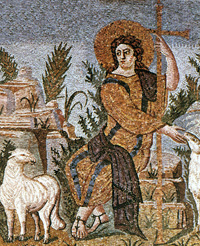
The Triumph of the Cross - September 14th
The Cross has always been central to Christian faith. Today’s celebration is very ancient; its origins are associated with St Helena, the mother of Constantine, the Roman Emperor who embraced Christianity as the religion of the empire. Helena journeyed to the Holy Land where she established churches in Jerusalem and Bethlehem. Legend has it that she brought back to Rome some of the wood of the cross of Christ. The title of today’s celebration echoes the attitude of Christian faith in Helena’s 4th century. It is a very different attitude from the one we have taken for granted for many centuries. In the 4th century, the Cross was Christ’s glorious trophy, carried by the Risen Lord as a symbol of his Paschal Mystery, his victory over all evil, even death itself. In the Middle Ages, however, as appreciation of the Paschal Mystery faded, the Cross became associated with the human sufferings of the Saviour. The familiar crucifix was seen as an invitation – as it certainly is – to repentance and conversion. Today’s liturgy teaches us that the truths that inspired these two different views can be brought together.
In the gospel reading from John, Jesus tells Nicodemus that ‘the Son of Man must be lifted up’, to open the way for humanity to eternal life with God. John’s gospel describes the Cross with overtones of the coming triumph – ‘When I am lifted up’, Jesus declares at the Supper, ‘I shall draw all things to myself’ (Jn 12:32); Pilate’s notice attached to the Cross proclaims Jesus as ‘King’; the ‘blood and water’, so solemnly described flowing from his open side, are a life-giving flood for the human family. (The old story of the bronze serpent, remembered in the first reading, reminds us how close the origins of old Israel’s remarkable faith were to the pagan practices around them. In fact this image was destroyed by the upright king Hezekiah [2 Kings 18:4].)
The reading from Paul to the Philippians provides a perfect complement to the gospel reading. Paul’s words are in the form of a hymn that comes to a glorious climax in the Paschal Mystery. In a few brief words, this hymn outlines the drama of Christ’s life among us: an abasement that is transformed – through ‘the glory of God the Father’ – into an exaltation as Christ is recognised as ‘Lord’, sharing all things with the Father. In his abasement, Jesus ‘emptied himself’ – putting aside the expression of the divine greatness that was his by right. He shared our life and became the Servant of all. In the end, he humbled himself even more, dying the death of a condemned criminal. Suddenly the dramatic movement of the hymn is reversed, God the Father ‘raises him high’ to receive adoration and acclaim from the whole of creation.
The liturgy has struck the balance. Emphasis upon the Paschal Mystery as a triumph must never forget that the horror of the Cross was the pathway to glory. Emphasis upon the human sufferings of the Crucified One must not eclipse the glorious light of the Resurrection. And our gospel reading assures us that the Cross is not something demanded by an angry God (as many are tempted to think) but the expression of God’s love – ‘God loved the world so much that he gave his only Son’, to be our ‘way’ from the darkened world we have made to the glory we are to share with him.
John Thornhill sm

